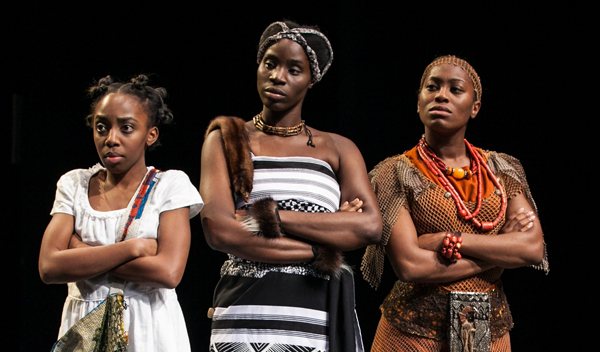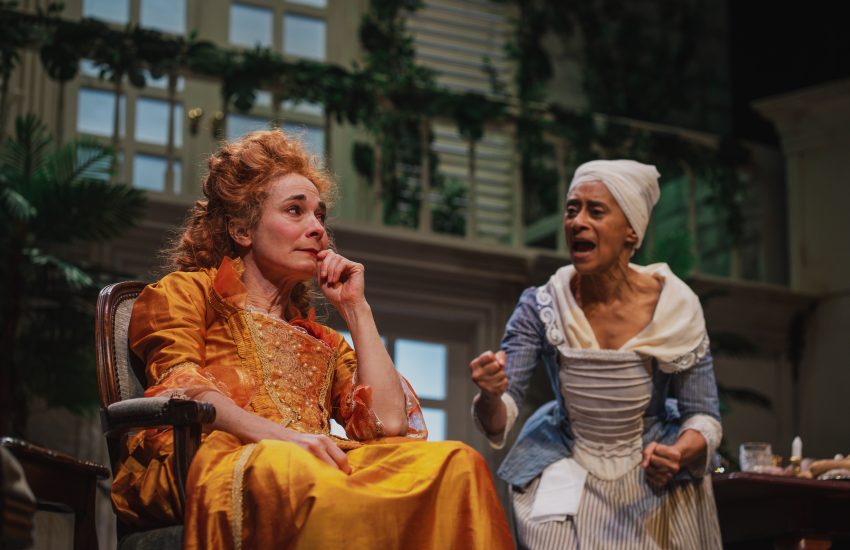Theatre Review: ‘How Nigeria Became: A Story and A Spear That Didn’t Work’
By Tola Ositelu
Somewhere in early 20th Century pre-industrialised West Africa, aspiring theatre director Herbert Ogunde (Tunji Falana) is having a hard time pacifying his two assertive wives: Igbo Chinedu (Rebecca Omogbehin) and Esomo (Stephanie Levi-John) of the Edo people. And pacify he must, because they are his star actresses – nay – his only actresses. He’s already set sights on expanding his, ahem, theatre company by marrying more wives. Thus he can hardly believe his good fortune when sweet, young Innocence (Rita Balogun) shows up to try out for a role; as unworldly as her name suggests. Half-way through her audition, High Commission proconsul Charles (Christian Roe) turns up unexpectedly to announce the British government’s decision to amalgamate disparate ethnic groups to form the ‘new’ country of Nigeria. It’s good for Empire business, you see. Charles approaches Herbert to put on a traditional play for the dignitaries at a forthcoming celebration of the new state. Ogunde chooses to stage the legendary tale of the hunt for the lost spear of Yoruba deity Sango, starring him and his otherwise all-female cast, an unintentionally progressive move on Herbert’s part. However Charles, emboldened by having been co-opted into rehearsals, doesn’t like the direction the story is taking. He insists on a tidy, inoffensive narrative that falls in line with the agenda of the colonial powers. The line between fable and reality becomes more and more indivisible.
Writer and director Gbolahan Obisesan’s witty and intelligent family-friendly piece ‘How Nigeria Became: A Story and A Spear That Didn’t Work’ serves as a non-condescending crash-course for those unfamiliar with modern West African history and a possible refresher for everyone else. 2014 marks the centenary since Africa’s most populous nation was ‘created’. Despite the underlying sense of indignation at Britain’s interference and disregard for the cultural diversity of the region, Obisesan isn’t burdened by a chip on his shoulder. The play satirises aspects of Nigerian culture with almost as much gusto as it does the arrogance of colonialism. Ibadan-born Obisesan gets the nuances of Nigerian English (part-nativised, part-Dickensian) down to a tee. The accents are mercifully authentic too. An honourable mention goes to Levi-John, (the only non-Nigerian apart from Roe), who avoids exaggerating her cadence to a farcical extent. It’s always impressive when a male auteur writes strong roles for women and Obisesan succeeds on this front too. Ogunde’s wives stand up to their feckless husband and wily female warriors outwit the many (sometimes libido-driven) characters portrayed by Herbert.
Beneath all the fun, frolics and exuberant dancing, ‘How Nigeria Became…’ also has its fair share of philosophical pondering. Most prominent of all is the writer’s enduring belief that a united Nigeria, regardless of its colonial origin, is better than one fractured along ethnic and religious lines.
Personnel:
Written & Directed by Gbolahan Obisesan
Set Design – Rajha Shakiry
Lighting – Azusa Ono
Choreographer – Diane Alison-Mitchell
Cast:
Rita Balogun – Oduduwa, Innocence and Jenrola.
Tunji Falana – Herbert Ogunde
Stephanie Levi-John – Esomo and Aguzani
Rebecca Omogbehin – Chinedu, Obaze and Hunter’s wife
Christian Roe – Charles
‘How Nigeria Became…’ @ The Unicorn Theatre, London until 9 November 2014.



